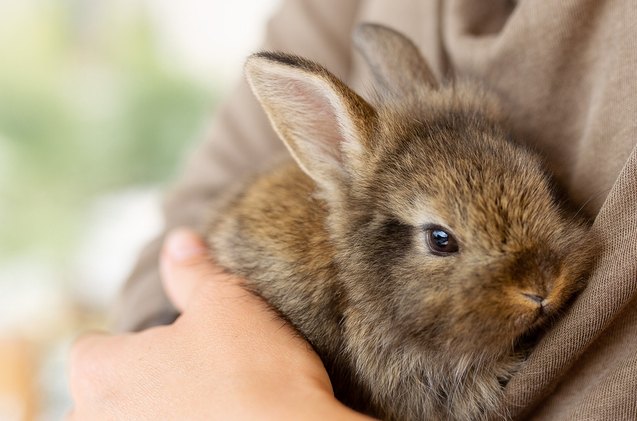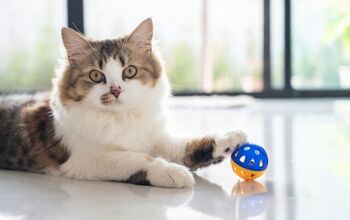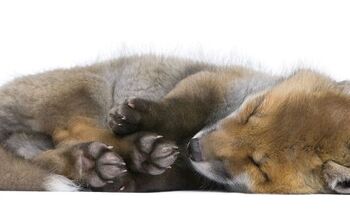Best Rabbits for First Time Owners

According to The American Pet Products Association (APPA), rabbits are continually topping the charts as the most popular small animal pet, placing them right behind cats and dogs. And sure, it’s easy to see why – bunnies are sweet, infinitely cute, and fun to be around.
Unfortunately, too many people decide to get a rabbit on a whim, thinking that they’re low-maintenance pets and as they are completely unprepared for caring for a rabbit, they end up abandoning them.
The truth is that rabbits, same as any other pet, have their needs and care requirements you’ll have to provide for to make sure they thrive in your care. To boot, not all rabbit breeds are alike – some are more energetic than others, some more docile, and some are much more open to handling and cuddling than others, which is why you should factor in the type of personality a breed has as much as you do looks.
If you are looking to welcome a rabbit to your family and you don’t have any experience with bunnies, these breeds will be a perfect match. Docile, friendly, and not overly demanding, these rabbits are perfect for any first-time owner!
#1 Mini Rex Rabbit
Best known for their plush and luxurious coat that makes them a delight to cuddle with, the Mini Rex rabbit has a sweet, friendly personality that makes them great for newbie owners. They are not moody or challenging to socialize (and even train), and will enjoy interacting with you, whether it’s quality playtime or a snuggle session. The Mini Rex rabbit weighs 3.5 to 4.5 pounds on average and has a lifespan of 5 to 7 years. They don’t need much space to be happy and don’t have a high-maintenance coat like some other breeds with stunning fur, such as the Angora rabbit.
Calm, docile, and adaptable, the New Zealand rabbit is beloved for their easy-going personality which makes them ideal pets for first-timers. Slightly on the bigger side, they weigh 10 to 12 pounds on average, but it goes to their advantage as they are not as fragile as some dwarf bunnies that need to be delicately handled. Easy to care for and generally robust, the New Zealand rabbit has a lifespan of 7 to 10 years. While the white coat color is the most common, these bunnies also come in blue, black, red, or broken.
#3 Mini Lop Rabbit
It’s hard not to fall in love with these soulful eyes and floppy ears – if you’re a newbie to the world of bunnies and have set your sights on a Mini Lop rabbit, you’ll be glad to know that they are ideally suited to first time owners. Affectionate, friendly, and adorably fluffy, these rabbits are a joy to be around and don’t need much to stay happy and healthy. They weigh 4.5 to 6 pounds on average, which is the preferred size of many beginner owners (not too small and not too big), and have a lifespan of 5 to 10 years.
#4 Polish Rabbit
This pocket-sized dwarf rabbit breed is a tiny bundle of joy that makes a perfect first-time pet rabbit for families of all shapes and sizes. Polish rabbits are quite small (weighing 2.5 to 3.5 pounds) and can be fragile, though, so if you have kids in the family, make sure that they know not to handle them unsupervised. Calm, docile, and very affectionate, the Polish rabbit is also considered low-maintenance, all of which make these bunnies a great choice for any beginner. Their lifespan is 5 to 6 years and they come in 6 officially recognized colors.
#5 Dutch Rabbit
Widely considered to be one of the most popular rabbits for first-time owners, the Dutch rabbit has everything a newbie could want in their first pet bunny: they are cute, easy to handle, and quite friendly and affectionate with their owners. Weighing 4.5 to 5.5 pounds, they are somewhere in between small and medium-sized, which means they won’t need much space and aren’t as delicate as dwarf bunnies. They come in various colors but are best recognized for their distinct markings. Their lifespan is 5 to 8 years.
#6 Flemish Giant Rabbit
In case you’ve always wanted a big bunny as a pet, but you’re worried they’d be too big of a challenge for a beginner, consider the Flemish Giant rabbit. With an average weight of 15 to 22 pounds, they are considered one of the largest rabbits in the world, but also one of the best choices for first-time owners. Sweet and friendly, these rabbits will quickly become your best friend without asking much in return. It’s important, though, to consider the fact that they’ll need a big enclosure and a lot of space for free play. Their lifespan is 6 to 10 years
#7 Harlequin Rabbit
For those first-time owners that would like an outgoing, sociable bunny that loves to cuddle and play, a Harlequin rabbit will be one of the best choices. Distinct for their unusual coloring and markings, these bunnies are somewhat of a social butterfly: they are docile, don’t need much to warm up to you, and are quite clever and playful to boot. As they weigh 6.5 to 9.5 pounds on average, they do need a bit more space to hop around than a compact bunny breed. They come in two color combinations – Magpie, which is black and white, and Japanese, which mixes orange with either black, chocolate lilac, or blue. They have a life expectancy of 5 to 8 years.
#8 Himalayan Rabbit
Easily recognized for their distinct markings that are similar to those of Siamese or Himalayan cats, this rabbit breed is not just a looker – they have a very calm temperament, which makes them perfect for first-time owners. The Himalayan rabbit is sweet, laid-back, and loves attention, so they won’t mind cuddles and will enjoy playing with you or kids in the family. These rabbits weigh 2.5 to 5 pounds, so they are just the right size for most people, and have a lifespan of 5 to 8 years.
#9 Lionhead Rabbit
Petite and unique, the Lionhead rabbit consistently tops the popular rabbit breeds lists thanks to their unusual looks and wonderful personalities. Boasting a wooly mane around their head which earned them their name, these bunnies are hard not to fall in love with – even more so when you get to spend time with them. Sweet, friendly, and fun-loving, these rabbits weigh 2.5 to 3.5 pounds and have a life expectancy of 7 to 10 years. Be warned, though – that stunning mane will need a bit of extra grooming!
#10 Chinchilla Rabbit
While bred for to resemble chinchillas, the only thing these rabbits share with their rodent friends is their looks – Chinchilla rabbits are easy-going, friendly, and generally considered minimal hassle pets. They weigh 5 to 7 pounds on average, and although not particularly energetic, they will need a bit more space for exploration and hopping around. Even though they boast luxurious silver fur, it’s not high-maintenance as it is short – only occasional brushing will be needed. As for their lifespan, you can expect your Chinchilla rabbit to be around for 5 to 8 years.
Things You Need To Consider Before Getting a Pet Rabbit
Even though people generally believe rabbits are undemanding pets, the truth is somewhere in between – while they are not as challenging as some pets, they do have basic needs you’ll need to meet. And before you adopt a rabbit, you’d do well to see if you are able to provide them with everything they need to be happy and healthy – and if not, it’s best not to get one.
- Rabbits need to live indoors
Pet rabbits are not suited to outdoor life – they are prey animals and if you leave them outside, they can easily be killed or hurt by a predator, ranging from owls and hawks to the neighbor’s dog. Not to mention that some rabbit breeds are more vulnerable to the elements than others, so too much heat or cold could seriously endanger them. Only adopt a rabbit if you are willing to keep them inside. They’ll need a spacious enclosure and space to spend time outside of it – which means either rabbit-proofing your apartment or getting a big dog pen so they can roam around safely.
- They need a fiber-rich diet
A rabbit’s diet consists primarily of timothy or other grass hay. This provides them with all the essential nutrients, adds much-needed fiber to their diet, and helps them grind down their teeth as they chew. The last is particularly important as a rabbit’s teeth grow throughout their life, and if they are not filed down through chewing food and special chew toys and treats, they can become overgrown and cause serious issues for your bunny. In addition to hay, rabbits will need a healthy portion of leafy greens on a daily basis, as well as smaller quantities of rabbit pellets.
- You will have to provide veterinary care
Even though rabbits are generally hardy pets, that doesn’t mean that they won’t need regular checkups to stay in top form. There are various common issues that can affect rabbits of all ages and breeds, from eye and ear infections to internal and external parasites, and preventative exams, as well as rigorous monitoring for any symptoms, can make a world of difference when it comes to treatment success and efficiency. Furthermore, you should have in mind that you will need to spay or neuter your rabbit when they get to around 6 months of age. In females, spaying can be a lifesaving procedure, as over 70% of unspayed females develop uterine cancer after the age of 3, and it also has a beneficial effect on their temperament. For males, in addition to reducing the risks of testicular cancer by far, neutering helps eliminate potential behavior issues such as aggression and territorial urine marking, both of which are common in unfixed rabbits.
- Grooming will become a part of your routine
Rabbits are avid self-groomers, but that doesn’t mean they won’t need your help. If a rabbit ingests too much of their fur (which often happens if they are shedding), it can result in an intestinal blockage, which is a potentially fatal condition. To prevent hairballs from getting stuck in your pet’s digestive tract, you’ll have to brush them regularly, especially come molting season. Luckily, this is nothing too daunting – in fact, brushing can be the perfect opportunity to bond and spend some quality time with your pet. In addition to regular brushing, you’ll also need to trim your pet’s nails, and keep them clean – they don’t need baths, but you’ll have to clean any dirt or debris from their fur.
- Rabbits have to be handled with care
Bunnies are delicate and should be held and handled with care, no matter their size. You should never, ever pick up your rabbit by their ears (as you might have seen done in movies) as it is not only incredibly stressful and traumatizing to the rabbit, but it could also result in an injury. You should make sure that you are fully supporting your pet’s whole body when picking them up, so they are not able to kick out of your hands if startled – which can happen often, as rabbits are timid since they are prey animals. Hold them firmly, with one hand always on their hind legs and the other supporting their front – not only does this give you a stronger hold on them, but it will make them feel more safe and relaxed when being picked up.

A proud mama to seven dogs and ten cats, Angela spends her days writing for her fellow pet parents and pampering her furballs, all of whom are rescues. When she's not gushing over her adorable cats or playing with her dogs, she can be found curled up with a good fantasy book.
More by Angela Vuckovic

































